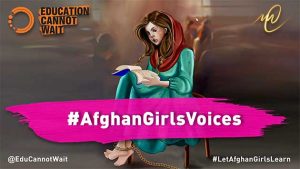Education Cannot Wait’s #AfghanGirlsVoices Campaign Highlights Real-Life Testimonies of Hope, Courage and Resilience by Afghan Girls Denied Their Right to Education
 14 Juni 2024
14 Juni 2024

The Rt. Hon. Gordon Brown, ECW Executive Director Yasmine Sherif and ECW Global Champion Somaya Faruqi mark 1,000th day of ban on girls’ education in Afghanistan
By External Source
NEW YORK, Jun 13 2024 (IPS-Partners)
Today, people across the globe mark a tragic milestone for human rights, children’s rights and girls’ rights: 1,000 days since girls were banned from attending secondary school in Afghanistan. To commemorate and reflect on this unacceptable milestone, Education Cannot Wait (ECW), as global fund for education in emergencies and protracted crises within the United Nations, is launching the second phase of its compelling #AfghanGirlsVoices campaign.
The campaign features inspiring artwork, poetry, cartoons and more from some of the world’s leading artists, along with powerful, moving quotes from Afghan girls denied their right to education, but who hang on to the hope that their right will be restored.
The first phase of the #AfghanGirlsVoices campaign was launched by the UN Special Envoy for Global Education, The Rt. Hon. Gordon Brown, ECW Executive Director, Yasmine Sherif, and ECW Global Champion Somaya Faruqi, the former captain of the Afghan Girls’ Robotics Team, in August 2023. Since the launch, the campaign has been viewed and supported by millions worldwide.
This second phase is already rallying additional global leaders and prominent supporters, including bestselling authors, Khaled Hosseini (The Kite Runner) and Christina Lamb (I Am Malala); ECW Global Champion and Al-Jazeera TV Principal Presenter, Folly Bah Thibault; UN Special Rapporteur on the situation of human rights in Afghanistan, Richard Bennett; Global Citizen Co-Founder Mick Sheldrick; 2023 Global Citizen Prize winner and founder of LEARN Afghanistan, Pashtana Durrani; and many more, including several leading Afghan women activists.
“The world must unite behind Afghan girls. The denial of the right to a quality education is an abomination and a violation of the UN Charter, the Convention on the Rights of the Child and fundamental human rights. Through the global #AfghanGirlsVoices campaign, people everywhere can stand up for human rights and stand up for gender-justice by sharing these stories of courage, hope and resilience,” said The Rt. Hon. Gordon Brown, UN Special Envoy for Global Education and Chair of the ECW High-Level Steering Group.
“As a global community, we must reignite our global efforts to ensure that every adolescent girl can exercise her right to an education. Gender discrimination is unacceptable and will only hurt the already war-torn Afghanistan and her long-suffering people. Girls’ right to an education is a fundamental right as outlined in international human rights law. For the people of Afghanistan – men, women, girls and boys – adolescent girls’ education is essential to rebuild Afghanistan and ensure that every Afghan enjoys the universal right to an education,” said ECW Executive Director Yasmine Sherif.
“Girls in Afghanistan are strong and resilient, and they refuse to give up their hopes and dreams. One thousand days without access to education is a severe injustice for Afghan girls, whose determination should be met with opportunities, not obstacles. Every day that passes, more and more girls find themselves forced into marriage due to lack of prospects for the future. This must stop,” said ECW Global Champion Somaya Faruqi. “The world must hear the voices of Afghan girls who are only asking for one thing: their most basic right to education to be fulfilled. With access to education, Afghan girls can contribute to building our country and be positive changemakers for our communities. All Afghan girls deserve an equal opportunity to learn and thrive, and it is our undeniable duty to fight for their right to education and their future.”
Approximately 80% of school-aged Afghan girls and young women are out of school, and nearly 30% of girls in Afghanistan have never entered primary education, according to UNESCO.
With the bans on girls’ secondary and tertiary education, decades’ worth of education and development gains have been wiped out. Between 2001 and 2018, enrollment increased tenfold across all education levels, from 1 million in 2001 to 10 million in 2018. By August 2021, 4 out of 10 students in primary school were girls. Along with these jumps came social and economic growth, and other improvements that benefited vast swaths of Afghan society.
The change in leadership sent seismic waves across all aspects of the Afghan economy and society. Today, 23.7 million people – over half the population – require urgent humanitarian support, 6.3 million people are displaced, and basic human rights are under fire. Girls and boys are at grave risk of gender-based violence, child labour, early marriage and other human rights abuses. Despite the urgent needs of the $3 billion total humanitarian response funding ask, only $221 million has been received to date, according to UNOCHA.
Since ECW launched its investments in Afghanistan in 2017, the Fund has invested US$88.8 million, reaching more than 230,000 children with quality, holistic education support. ECW’s multi-year investments focus on community-based learning that reaches girls and boys through a variety of activities such as the provision of teaching and learning materials, teacher training, and mental health and psychosocial support.
